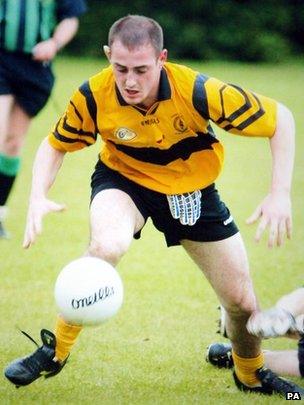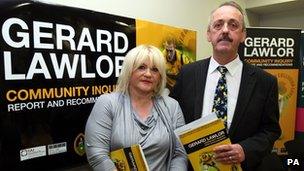Lawlor family wants new force to look at Belfast murder
- Published

Gerard Lawlor was shot dead by the UDA ten years ago
The family of a Catholic teenager shot dead by loyalists in north Belfast are calling for a new police investigation.
Gerard Lawlor, 18, was shot dead by the UDA as he walked home near the Antrim Road in July 2002.
It was one of the first sectarian murders to be investigated by the Police Service of Northern Ireland, but his family said the force had failed to bring anyone to justice.
They want a new investigation carried out by a service other than the PSNI.
His parents decided to set up their own inquiry into the murder and appointed a panel of legal and academic professionals to look at the case.
The panel said police did not do enough in response to a series of murder bids by loyalists in the same area in the hours before Mr Lawlor was shot.
It claimed there were serious deficiencies in the subsequent investigation of the crime, namely failures to interview potential witnesses and suspects and take appropriate forensic measures, and that these amounted to "collusion".
The findings have prompted the teenager's parents John and Sharon to demand a fresh police investigation.
The father-of-one was shot dead just after midnight on 22 July, 2002 as he walked home along the Floral Road in Glengormley after a night out.
Two men on a motorbike pulled up beside the gaelic footballer and shot him three times.
Catholics had been targeted in four other random attacks in the two hours before the murder, apparently sparked after an attack on a Protestant man earlier on the evening of 21 July.
The inquiry team claimed that police did not "lift one finger" to prevent the escalating series of incidents, such as mount road blocks.

Sharon and John Lawlor want a new investigation
"By failing to look at the overall picture of what was happening that night, they failed to treat it for what it was: a loyalist rampage hell-bent on killing Catholics, or, to use the police's own term, a major incident," the report said.
Gerard's father John said the family felt it had no other option but to pursue a "community inquiry" because they were not getting answers from the state.
"It's up to the police now to review the case or open it up as a new investigation," he said.
Mr Lawlor said he still hoped that justice would be done.
"You have to have belief in the system - that's the whole point of having one rule of law," he said.
The teenager's mother Sharon said the lack of convictions were a source of great anger.
"As the years go on you build up anger through pure frustrations and you get to this stage you are driven by it," she said.
"Everybody seems to know who these people are, people know what happened but the PSNI and the (Police) Ombudsman, they don't seem to be getting the whole story that everyone in the street seems to be getting and that frustrates me big time."
The report was compiled by Jane Winter, the director of British Irish Rights Watch, Professor Bill Rolston, director of the Transitional Justice Institute at the University of Ulster, and Gemma McKeown, a solicitor for the Committee on the Administration for Justice (CAJ).
Catholic men targeted on the same night as Mr Lawlor's murder, who gave evidence to the inquiry, attended the launch of the report in Belfast on Thursday.
Among them was Ryan Corbett, who was standing outside a bar when a man on a motorbike attempted to shoot him but the gun jammed, and Jason O'Halloran, who about half an hour later, was seriously injured after being shot three times.
Sinn Fein North Belfast MLA Gerry Kelly said the police had to answer the questions raised by the report.
"This was the first inquiry of the PSNI so people did expect a new process based on the law to have taken place and in this case it didn't happen," he said.
In response to the report, a PSNI spokesman said: "The investigation into the murder of Gerard Lawlor has been reviewed by the PSNI Serious Crime Review Team and is currently the subject of a PONI (Police Ombudsman of Northern Ireland) investigation and, as such, it would be inappropriate to comment."
He appealed for anyone with information about the murder to come forward to police.